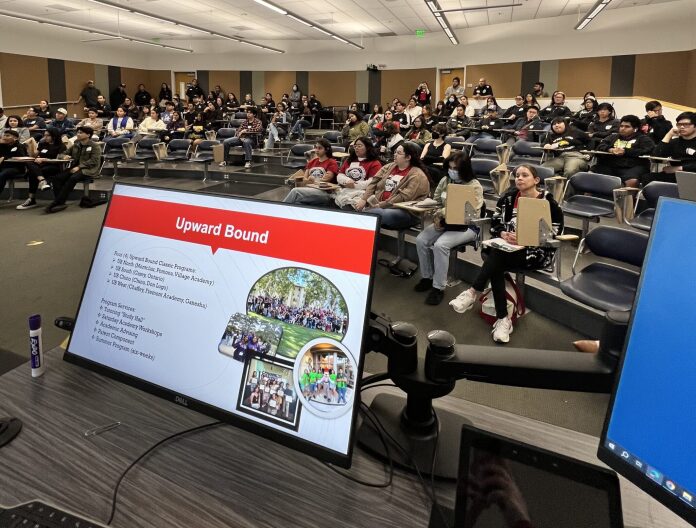Expanding Opportunities for Low-Income and First-Generation Students
This summer, low-income and first-generation students across California are experiencing college life for the first time. High schoolers are camping by the Klamath River, while undergraduates are presenting research at a symposium in Long Beach. These experiences are part of federally funded TRIO programs such as Upward Bound and McNair Scholars, which operate on campuses throughout the state—from rural institutions like Columbia College near Yosemite National Park to private universities like the University of Southern California.
TRIO programs begin as early as middle school, offering mentorship, academic guidance, and research opportunities. In the 2023–24 academic year, these programs reached over 100,000 participants in California alone. For many, these programs are crucial in navigating the path to higher education.
Ekaterini Stamatakos, a 22-year-old psychology major who transferred from City College of San Francisco to UCLA, credits TRIO with helping her succeed. “I really don’t think I could have made it through City College without them,” she said. “These programs go beyond what they claim on their websites—they make a real impact.”
However, TRIO programs now face a potential threat. A proposal from the Trump administration aims to eliminate funding for TRIO Student Support Services, including tutoring, college application assistance, and financial literacy workshops. If enacted, this would mean defunding these services starting in fiscal year 2026. The future of TRIO funding remains uncertain until Congress finalizes its appropriations bill later this year.
Despite past challenges, TRIO has maintained strong bipartisan support. With an annual budget exceeding $1 billion, the program continues to be a key player in college access. However, the White House has argued that TRIO is outdated, claiming that college access is no longer the main barrier for students from low-income backgrounds. Instead, the administration suggests that colleges should take responsibility for engaging with K–12 schools and supporting students once they enroll.
Supporters of TRIO have launched a public awareness campaign to ensure the program remains funded. In California, there were approximately 450 TRIO programs in the 2023–24 academic year, with most funding directed toward programs at over 100 colleges and universities.
The proposed cuts come amid broader changes under the Trump administration. Recent Supreme Court rulings have opened the door for mass layoffs at the U.S. Department of Education, and California is part of a coalition suing to release $6.8 billion in frozen federal school funding. Other changes include modifications to financial aid policies and how civil rights law is interpreted.
TRIO programs based in California, such as those at Sonoma State University, Cal Poly Pomona, and UC Davis, receive millions annually and serve thousands of students. Smaller programs, often at community colleges, may work with dozens or hundreds of students on budgets under $300,000.
Programs That Make a Difference
At Cal Poly Humboldt, high school students and rising college freshmen read August Wilson plays before attending a live performance at the Oregon Shakespeare Festival. At Cal Poly Pomona, peer coaches help students prepare presentations on topics like artificial intelligence and internships. Meanwhile, at Columbia College, a TRIO director works with students ranging from 14-year-olds in dual enrollment programs to 72-year-olds pursuing master’s degrees.
Studies generally show that TRIO has a positive impact on academic outcomes, such as college enrollment and degree completion. Alumni of TRIO programs have gone on to become lawmakers, astronauts, and leaders in local TRIO initiatives. Rafael Topete, who leads the TRIO Student Support Services Program at Cal State Long Beach, noted that some alumni have children now thriving in college.
TRIO has faced challenges before, including attempts to reduce its budget during the Reagan and Clinton administrations. However, bipartisan support has historically protected the program. Critics, however, point to a 2009 study suggesting that Upward Bound had no significant impact on postsecondary enrollment. A subsequent rebuttal study found a strong positive effect.
Recent reports from the U.S. Government Accountability Office suggest that the Department of Education needs to improve how it evaluates TRIO. Education Secretary Linda McMahon has used these concerns to justify defunding the programs, stating that the effectiveness of TRIO is not clearly measurable.
Despite these criticisms, TRIO supporters argue that the program meets all federal reporting requirements. Kathy Kailikole, who has worked in TRIO for 30 years, emphasized that the program consistently tracks metrics such as high school graduation rates and college enrollment.
Consensus Amid Partisan Divides
TRIO has remained a point of agreement in a politically divided Congress. Federal funding for TRIO has increased from $838 million in 2014 to nearly $1.2 billion in 2023. The Congressional TRIO Caucus includes 26 Republicans, with figures like U.S. Sen. Susan Collins and U.S. Rep. Mike Simpson advocating for continued support.
However, recent developments may test this consensus. Three Upward Bound grantees outside California received notices that their funding would not be renewed due to conflicts with Trump administration priorities. One cancellation letter cited violations of civil rights law and inappropriate use of federal funds.
Reaching Rural Communities
In rural areas of California, TRIO programs play a vital role in providing educational opportunities. Jen Dyke, who directs the Upward Bound program at Cal Poly Humboldt, travels extensively to recruit students from remote communities. She highlighted the economic challenges facing these regions, where industries like timber and fishing have declined, and tourism has suffered due to wildfires.
Rose Sita Francia, another TRIO director at Cal Poly Humboldt, focuses on exposing students as early as sixth grade to career options. “We need to put college on the map for them,” she said. Many students are unaware of where their local colleges are located.
Anneka Rogers Whitmer, who oversees TRIO programs at Columbia College, faces unique challenges in reaching students in an education desert. With limited staff, her team visits prisons and social service agencies to provide guidance on financial aid and vocational training.
Supporting Students in Transition
Ghislaine Maze coordinates the TRIO Writing Success Project at City College of San Francisco, which offers more than writing workshops. “So many students are trying to figure things out on their own,” she said. “It’s easy for them to get lost or discouraged.”
Tight campus budgets can leave other academic advisers overbooked, making it difficult for students to get appointments. TRIO mentors help navigate financial aid and academic planning. For Ekaterini Stamatakos, this support was transformative. After years of academic struggles and housing instability, she found a sense of belonging in the TRIO program. “This is perfect,” she thought. “I’m just going to basically live there.”
With the help of a writing tutor, she earned an ‘A’ in a course she once thought impossible. “I don’t think I ever imagined that I would get an ‘A’ after my years of failing classes,” she said.






